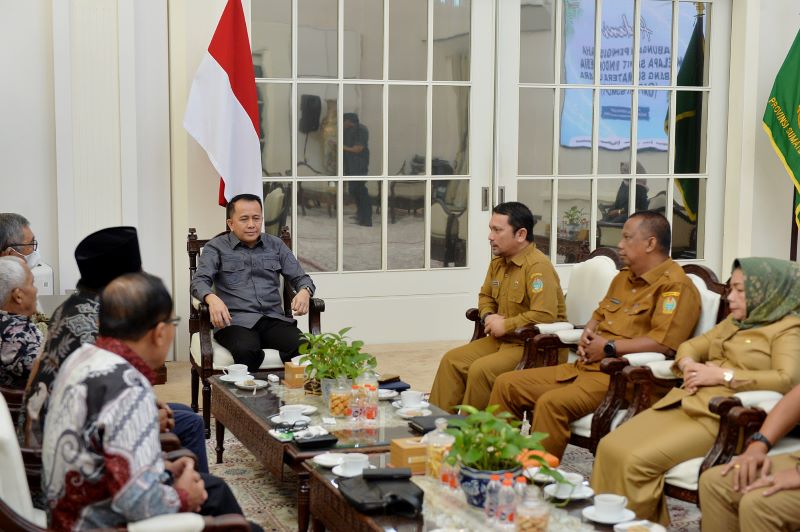News
North Sumatra and GAPKI Holds Meeting on Local Palm Oil Industry
WINDONESIA November 8, 2024 Acting North Sumatra Governor Agus Fatoni receiving GAPKI North Sumatra at the North Sumatra Governor's official residence in Medan City, North Sumatra on Nov. 5, 2024. (kliksumut.com/North Sumatra Provincial Government)
Acting North Sumatra Governor Agus Fatoni receiving GAPKI North Sumatra at the North Sumatra Governor's official residence in Medan City, North Sumatra on Nov. 5, 2024. (kliksumut.com/North Sumatra Provincial Government)
Acting North Sumatra Governor Agus Fatoni and the Indonesian Palm Oil Association (GAPKI) North Sumatra held a meeting to discuss various crucial issues in the palm oil industry at the North Sumatra Governor's official residence in Medan City, North Sumatra on Nov. 5, 2024. The discussion included the Palm Oil Rejuvenation (PSR) program, oil palm revenue sharing funds (DBH), as well as labor, production, and efforts to maintain the security of palm oil plantation investments in North Sumatra.
"Oil palm has a very large role and impact North Sumatra, from its productivity to its workforce. Oil palm is an important factor that can accelerate progress, independence, and local community welfare," Fatoni claimed.
He highlighted the need for synergy between the government and business actors to overcome challenges such as replanting of oil palm plantations, looting, and legal issues related to land uncertainty. The PSR program, which aims to raise productivity and quality of plantations through assistance to farmers for replanting oil palms, is in focus for those matters.
Fatoni also emphasized the importance of an integrated approach in the management of oil palm DBH and Corporate Social Responsibility (CSR) programs by palm oil companies.
"We need to ensure that CSR contributions from companies truly have a direct impact on the local community, such as in the form of building houses of worship or educational scholarships," he noted.
GAPKI North Sumatra Chair Timbas Prasad Ginting stated that land legality issues and bureaucratic obstacles are still the main challenges in accelerating PSR. The program, which initially provided a grant of Rp25 million per hectare (ha) for replanting smallholder oil palm plantations, received high enthusiasm from farmers.
"However, legal and regulatory obstacles need to be overcome immediately through harmonization of regulations between the government and industry," he explained.
There are around 490,000 ha of smallholder oil palm plantation land out of 1.4 million ha of total oil palm plantation land in North Sumatra based on North Sumatra Province Plantation and Livestock Office (Disbunak) data. However, only 25,581 ha have received PSR assistance from 2017 to 2023. For 2024, the North Sumatra Disbunak targeted 9,500 ha of oil palm plantation lands replanted, but just 3,000 ha of that target has been reached as of November 2024.
In the meeting, Fatoni and stakeholders from various agencies, including North Sumatra Disbunak Head M. Zakir Syarif Daulay, North Sumatra Environment and Forestry Office Head Yuliani Siregar, supported the importance of cross-sector collaboration. Such collaborations are expected to encourage the palm oil industry's continuity in North Sumatra while still paying attention to environmental sustainability.
"Oil palm [industry's] continuity is not only about productivity, but it also concerns environmental preservation, support for the surrounding community, and investment security. For those reasons, strong synergy is needed between the government and business actors in maintaining the industry's sustainability," Fatoni concluded.

